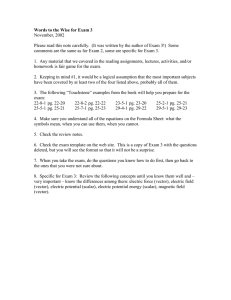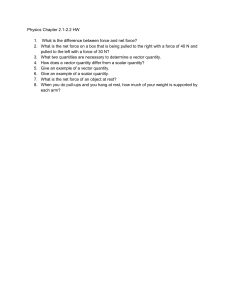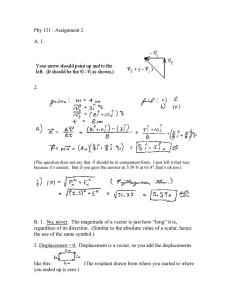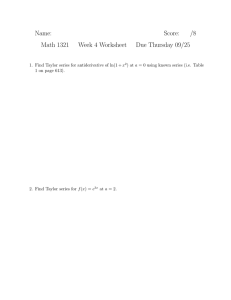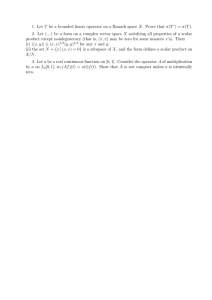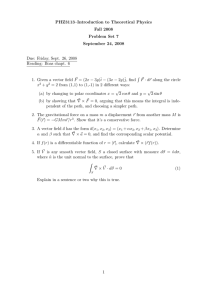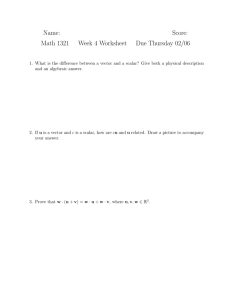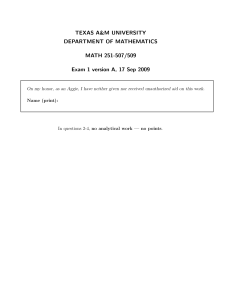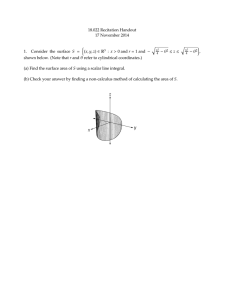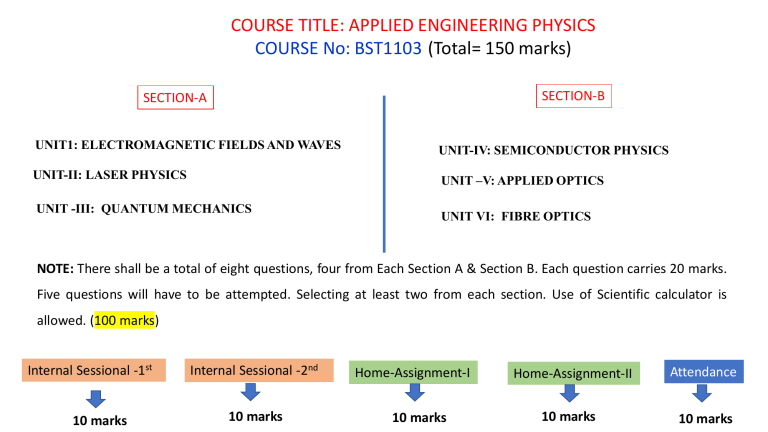
COURSE TITLE: APPLIED ENGINEERING PHYSICS COURSE No: BST1103 (Total= 150 marks) SECTION-B SECTION-A UNIT1: ELECTROMAGNETIC FIELDS AND WAVES UNIT-IV: SEMICONDUCTOR PHYSICS UNIT-II: LASER PHYSICS UNIT –V: APPLIED OPTICS UNIT -III: QUANTUM MECHANICS UNIT VI: FIBRE OPTICS NOTE: There shall be a total of eight questions, four from Each Section A & Section B. Each question carries 20 marks. Five questions will have to be attempted. Selecting at least two from each section. Use of Scientific calculator is allowed. (100 marks) Internal Sessional -1st Internal Sessional -2nd Home-Assignment-I Home-Assignment-II Attendance 10 marks 10 marks 10 marks 10 marks 10 marks UNIT 1 Electromagnetic Fields and Waves By Dr. Shammi Kumar Deptt. of Physics, GCET, Jammu Weightage= 20 marks Topics:Concepts of Del Operator- gradient, divergence, curl and their physical significances, Displacement Current. Maxwell's equations in integral and differential form, Poynting vector and Poynting theorem, Electromagnetic wave propagation in free space (e m wave equations for electric & magnetic fields for free space) & their solutions (plane wave solution), velocity of E M waves, Relation between Eo & Bo. 08 lectures The behavior of a physical quantity in a given region of space is described by its value at each point in that region of space. Field:- A field is a function that describes the behavior of a physical quantity at all points in a given region of space. The physical quantity described by the field can be a scalar quantity or a vector quantity. Thus field can also be scalar filed or a vector field Scalar Field: • It is a function that gives us a single value of some physical quantity for every point in space. • In a scalar field each point will have magnitude corresponding to that scalar quantity. HOT 1 Cold 2 3 A Ice Ice q B Ice Water drops Fig. 1 VA VB Fig. 2 Representation of Scalar Field • A scalar field is represented by imaginary surfaces known as level surfaces. • A level surface is a surface at which the value of a scalar is same • E.g; equipotential surfaces, equithermal surfaces etc. Mathematically Φ = Φ(𝑟) Φ= Φ(x,y,z) Φ is a scalar quantity Vector Field: • A vector field is a function that gives us both magnitude and direction of some physical quantity for every point in space. • In a vector field each point will have magnitude and direction corresponding to that vector quantity. 𝐸𝐴 q 𝐸𝐵 Fig. 1 Fig. 2 Representation of Vector Field • A vector field is represented by flux lines known as lines of flow. • A tangent to these lines at a point gives the direction whereas the density/length of these lines at any point represent the strength(magnitude) of the field at that point. Mathematically 𝐴Ԧ = 𝐴Ԧ (𝑟) 𝐴Ԧ = 𝐴Ԧ (x,y,z) 𝐴Ԧ is a vector quantity Del operator/Nabla operator( By William Rowan Hamilton (1805-1865). Also k/as vector differential operator Clearly, it represents the spatial rate of change of a physical quantity. By itself, it has no meaning. It assumes a physical meaning only when it is applied to some function. How it will operate on scalar and vector fields? φ = gradient of φ= grad φ . 𝑉 = Divergence of 𝑉 = div 𝑉 X 𝐴Ԧ = Curl of 𝐴Ԧ = Curl 𝐴Ԧ += addition operator d/dx= differentiation operator ∫ dx = integration operator Gradient of a Scalar function Consider a x,y,z cartesian coordinate system placed in a scalar field function associated with every point of a certain region in space so that it defines a scalar field. Let A and B be two points in this region having coordinates (x, y, z) and (x +dx ,y + dy, z + dz) respectively. The position vectors of A and B 𝑂𝐴 = 𝑂𝐵 = Let change in φ in going from A to B is dφ , then 1gm of water after a distance of 01 step …..(iv) Rate of change= 1gm/step Total change after 10 steps= 01 gm/step x 10 ) .( …..(v) ( ) Φ+dφ …..(vi) φ …..(vii) is known as gradient of φ and is written as grad φ Physical significance of Gradient of a scalar function Change in the scalar function Displacement vector Gradient of scalar function Gradient of φ is always normal to a level surface But dφ =0 Therefore Angle between A =0 And = 90o Is normal to a level surface 90o Level surface B dφ=0 Φ= constant Try some numericals N1. Find the grad φ at points (0,1,2) where φ = x3y+ xz N2. Find a unit vector normal to surface x2+ 3y2 + 2z2 + 6 at P(2, 0, 1). 1 N3. Find grad , where 𝑟 = x𝑖Ƹ + y𝑗+Ƹ z𝑘 𝑟 N4. Find grad rn , where 𝑟 = x𝑖Ƹ + y𝑗+Ƹ z𝑘
